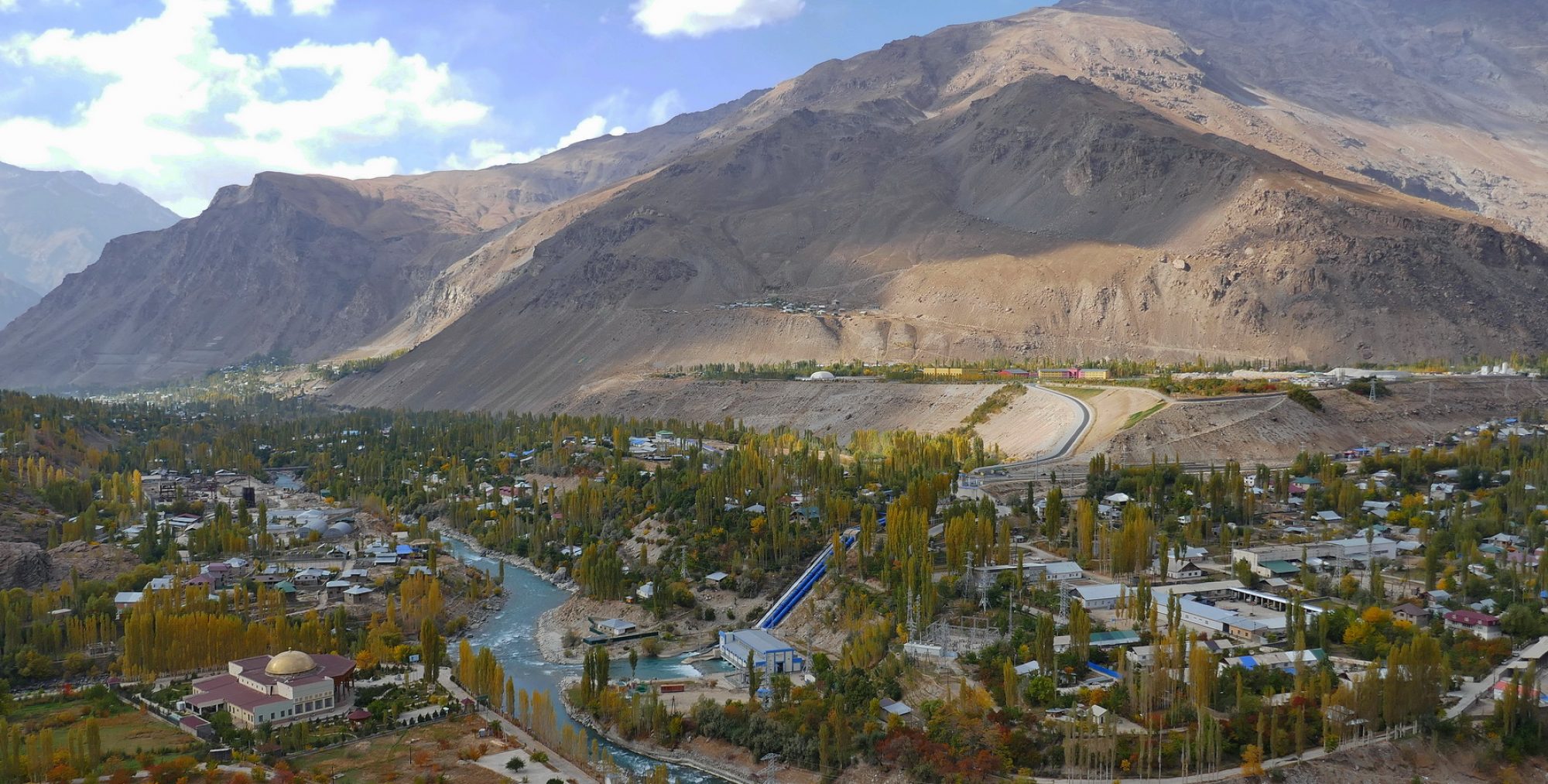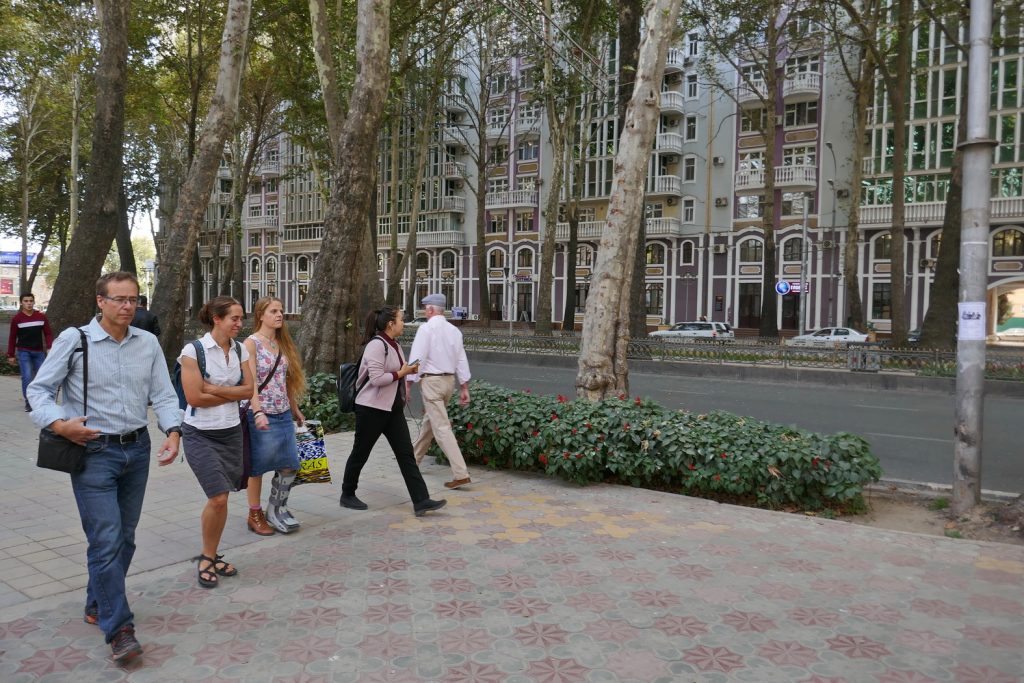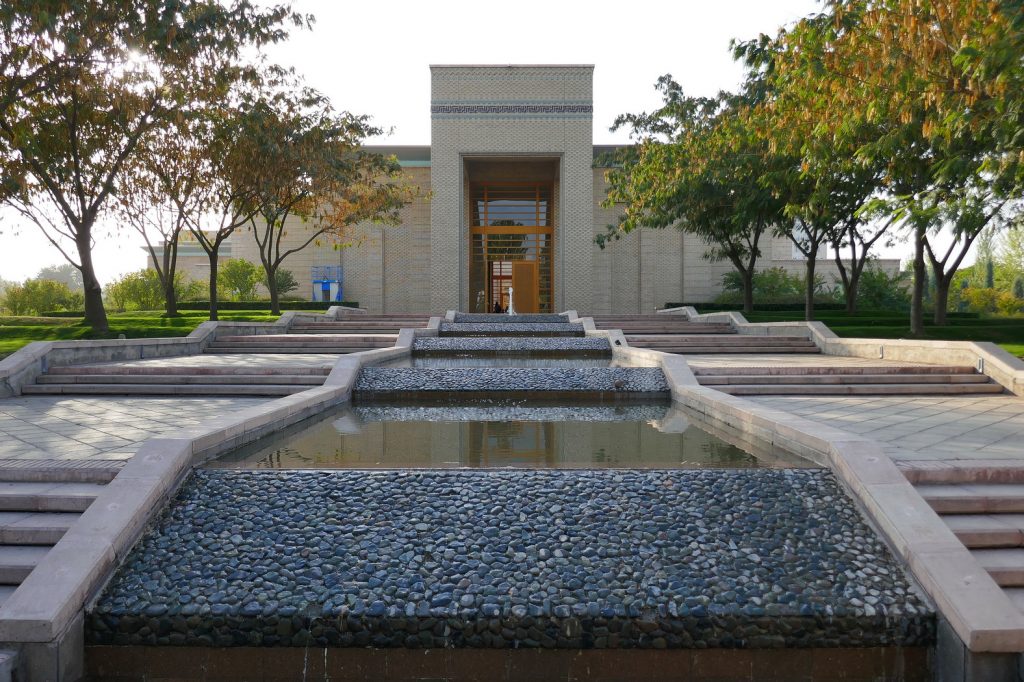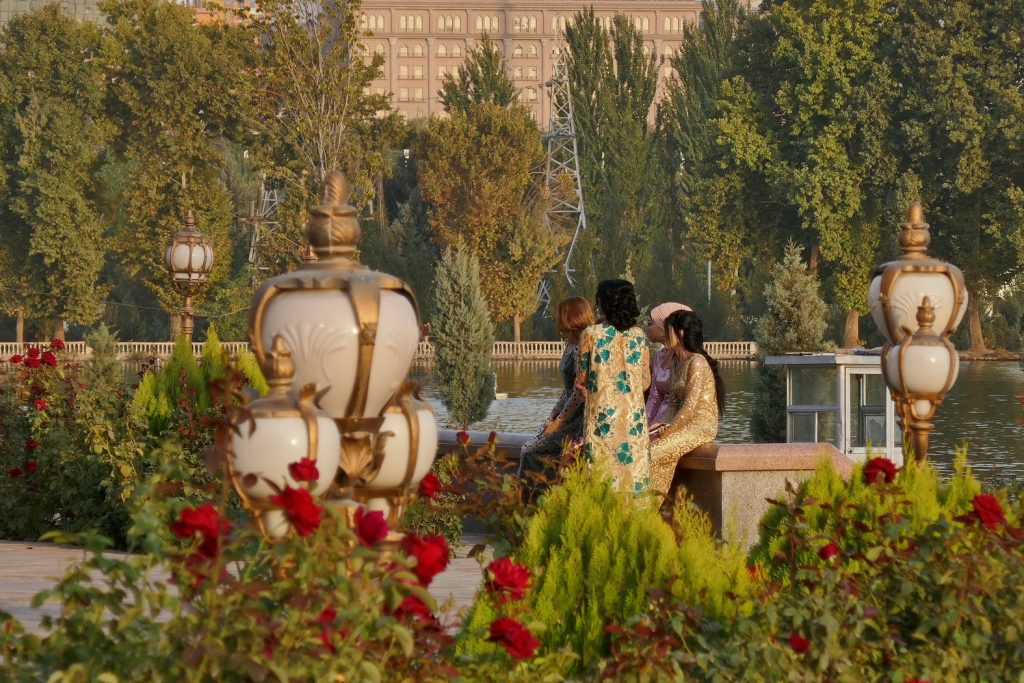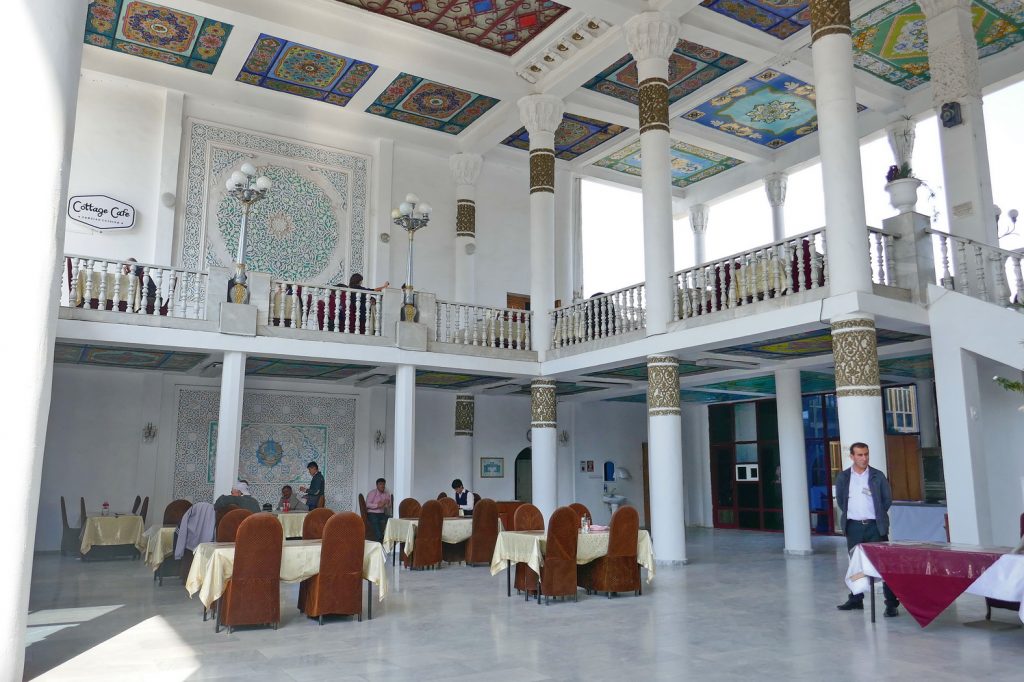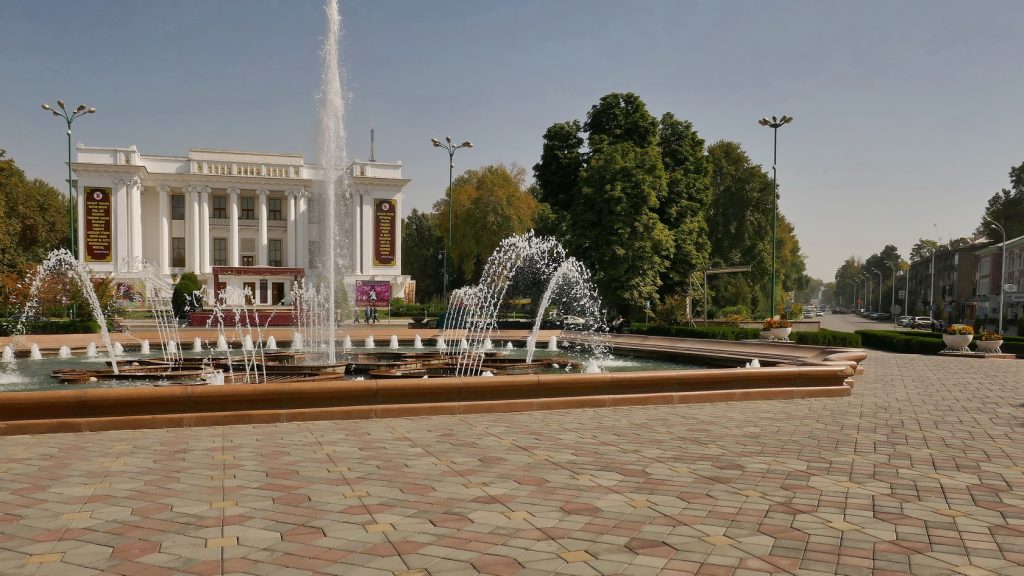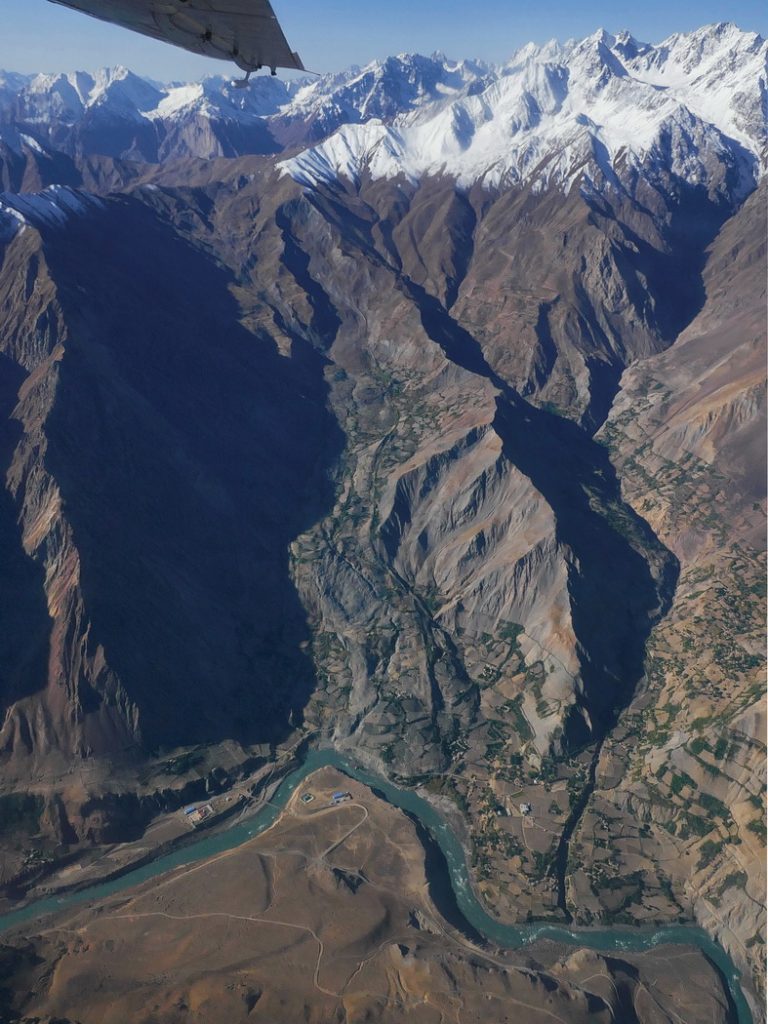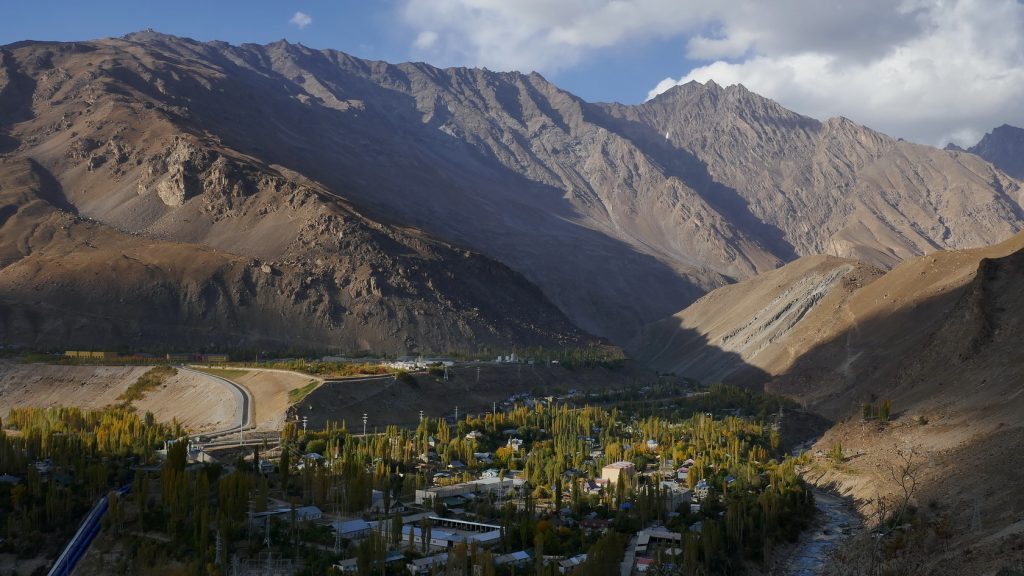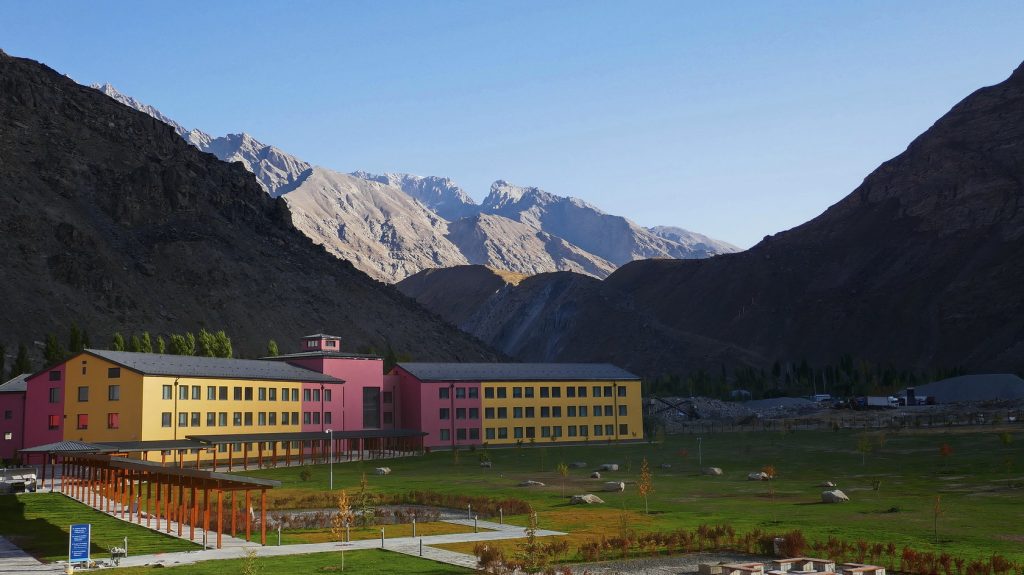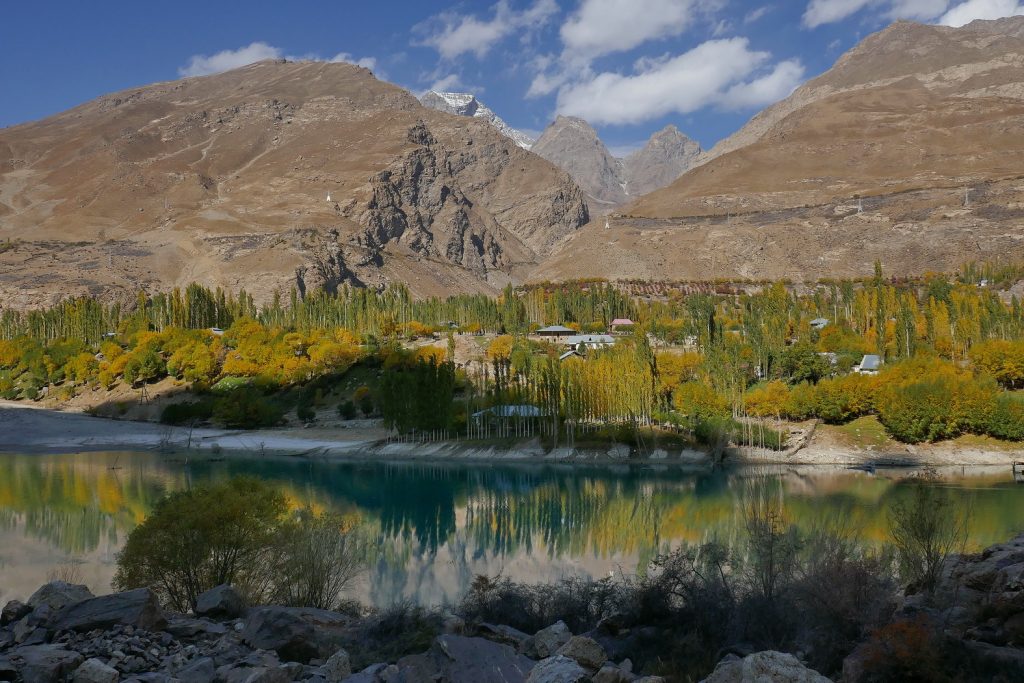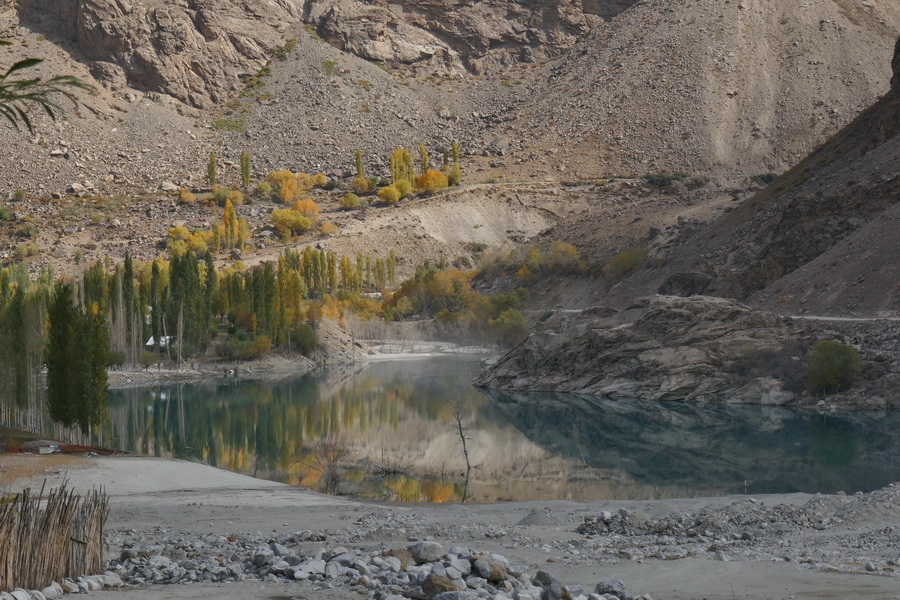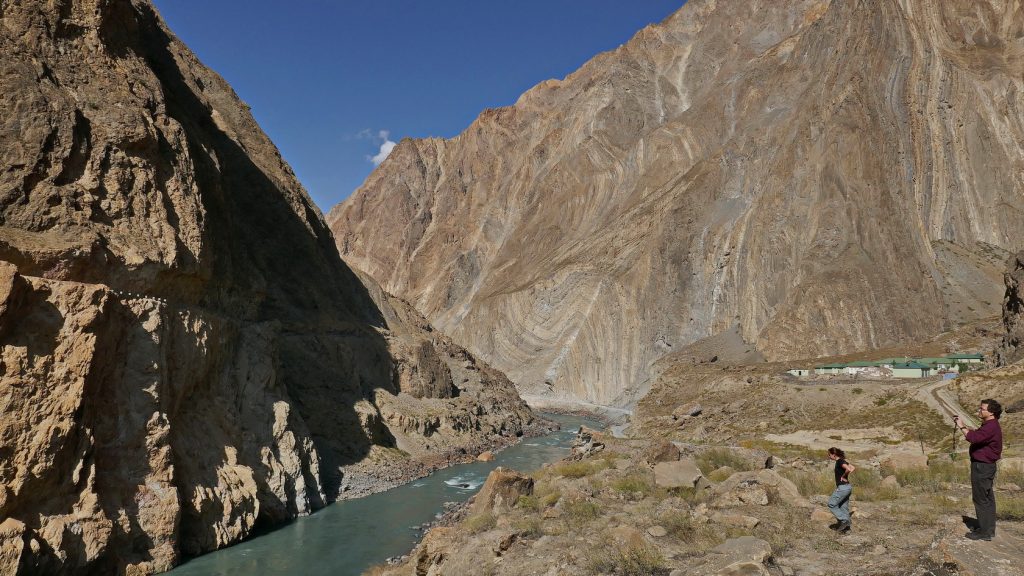On May 25th, the UCA news feed reported briefly on meetings between UCA senior leadership and senior Canadian Ambassadorial personnel for Central Asia. UBC-UCA curriculum development partner representative, Phil Hammer was also in attendance. For details and a photograph, see http://www.ucentralasia.org/Resources/Item/1668.
Quick report from the field
The trip to Central Asia has been a great success. It unfolded in three parts: 1) tour into the High Pamirs and down towards the Wakhan Corridor; 2) meetings at the Khorog campus, Tajikistan; and 3) meetings in Bishkek & the Naryn campus, Kyrgyzstan.
‘Report’ from part 1, by Phil Hammer, May 14th.
The trips to see the Pamirs and absorb more of the culture have been fantastic! Lots of ideas for everyone for future trips and also things that will filter into the courses.
The Alichur trip that Chris and I did with Kobil was wonderful – really great in all ways. Incredible landscape (4000+m high, broad valleys) and we learned so much hanging out with the Wildlife Conservancy guides, talking with shepherds (through interpreters), spotting Marco Polo sheep and Siberian Ibex, setting up cameras to capture snow leopards prowling on two ridges, living in the head guide’s guesthouse. The Panthera project there is designed to increase snow leopard numbers that have plummeted over the last few decades. Overgrazing has led to the population of their major prey dropping. So, the goal is to improve grazing management, to help the sheep and ibex recover, to help the snow leopards recover. The communities have bought in. They have been developing guiding of tourists for wildlife spotting and big game hunting to raise money. That is then used to pay shepherds to rest valleys for a year or two. One MarcoPolo sheep can bring $20,000USD into the conservancy – a HUGE amount of money that is used for the project, but also community projects. It appears to be working… Chris was fascinated by the project and was bursting with research ideas!
We just returned from a 3 day trip with Brendan and Tara. We went south to Ishkashim and got to Darshai (after lunch and a couple of interesting road-side stops) where we went hiking with the head of the Darshai Wildlife Conservancy (primarily Ibex there). We stayed at his guesthouse and by dumb luck, Stefan Michel was there. He is the German that started the entire wildlife conservancy program initially (through GIZ I believe). So Chris and Tara have made contact with him directly. Nice guy… sort of retired from that project now, but he remains involved in some ways. He was their with his wife on a vacation.
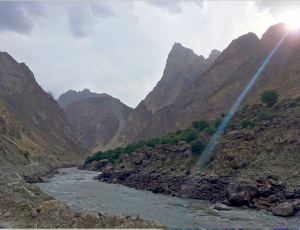
Then a tourist day on the way to Langar with a few interesting stops (the Bibi Fatima hot springs and lunch and a Pamiri museum in Yamg were the highlights). Then yesterday we didn’t retrace our steps but rather drove on from Langar up the Pamir river (along the Afghan border) up to the Alichur Pamir. LandCruisers on the Tajikistan side of the Pamir river – camel caravans on the Afghanistan side!
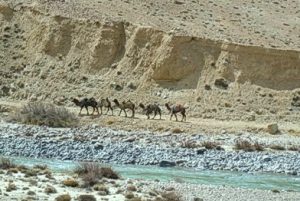
Camel caravan across the river in Afganistan. (C) P. Hammer
We took a short side trip to Bulunkul/Yashikul lakes (beautiful area but also the coldest spot in Tajikistan (-50C)) and had hot fresh bread and lunch with a family in the village there thanks to our driver. Then we continued back down the Gunt River along the Pamir Highway, stopping briefly at the 2015 Barsem debris flow. . Part of the drive was a repeat of what Chris and I had already done twice, but we thought it would be good for Tara/Brendan to see the high valleys (Alichur Pamir and Greater Pamir) as the geography there is very different. So an excellent trip and a highly recommended loop for future groups going over.
A bonus on the trip was that during the first 2 days (in the Wakhan Valley) we had a Concordia history prof who is writing a book about Tajikistan hitch with us from UCA. He was heading for China and had arranged a ride from Langar. He was a wealth of information. On our 3rd day, our driver had more of a chance to contribute which was good because he turned out to be hilarious and very knowledgeable.
May 2018 – busiest month yet
As summer 2018 begins, the UBC/UBC curriculum development partnership is gearing up for the busiest month we’ve had to date.
Summer support: First, we welcome three UBC students to our team for summer jobs as undergraduate academic assistants. We aim to support all of the 19 core EES courses as equitably as possible.
- Fatima Mannapbokova has just finished her Geography degree (congratulations!) and is working full time for the summer.
- Qingyang Liu, 3rd year Geography, is starting mid-May in a UBC WorkLearn position, working roughly 1/2 time for the summer.
- Iram Malik, entering 3rd year chemical and biological engineering, also starting mid-May in a half-time WorkLearn position.
They will help conduct background research on important issues related to Earth and Environmental Sciences in Central Asia. Our course development team is looking forward to using the information, resources, case histories, data sets and so on, that our summer team finds. We will also benefit from some support with project reporting, background information gathering and documentation (on this blog and elsewhere), testing and maybe some development of learning tasks, and likely some other contributions
Travel to Central Asia: Chris, Phil, Tara and Brendan (see Personnel) are visiting Tajikistan and Kyrgyzstan between May 4-24. They will meet with NGO, government, academic and AKDN affiliates to discuss educational opportunities. They will also spend a few days exploring the southern Pamirs, and observing some field work being conducted by Kobil Shokirov and Jordan Lavine related to wildlife and conservation programs. Kobil and Jordan have been amazingly welcoming and helpful in arranging for our team to shadow their work.
UCA instructors at UBC: Four UCA instructors from Khorog and Naryn campuses will visit UBC in late May to work with our three prerequisite course developers. These courses will be taught for the first time starting September 2018 and January 2019, and we are looking forward to collaborating with our colleagues to ensure these challenging science courses are as effective and efficient as possible.
Course development: Meanwhile, course developers who are not traveling are working on syllabi and lessons.
Whew! Lots happening! There should be updates on these and other project activities throughout the summer.
Promoting Earth and Environmental Sciences
University of Central Asia graduates with knowledge and skills in Earth and Environmental Sciences will be making the decisions that will ensure productive and sustainable management of the natural resources in the uniquely beautiful mountainous regions of Central Asia.
This promotional video (in English, with Russian subtitles) was produced during the UBC team’s first visit to the Khorog Campus in Tajikistan, October 2017. They discuss their passions for learning and working in sciences related to Earth and its environmental.
See also >UCA’s media web page.
Progress meeting at UBC.
Between March 3 – 6, we had a most productive 4-day meeting with colleagues from Central Asia, Europe, Canada and USA. Here is a brief summary:
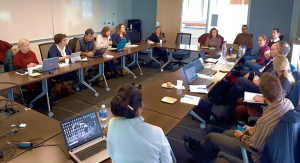
- Prerequisite course developers at UBC met and discussed curriculum and course details with review committee members visiting UBC from Seneca (Toronto), U. Montana, Universität Siegen (Germany), ZHAW Zurich University, and U. Central Asia (Kyrgyzstan and Tajikistan).
- Detailed presentations and discussions about prerequisite courses (chemistry, physics, biology), followed by very productive discussions about courses themselves as well as the review process.
- Developers of core Earth and Environmental Sciences program courses attended to meet reviewers. They provided valuable insight and creative suggestions for all aspects discussed during this meeting.
- The upcoming visit of UBC team members to Central Asia was discussed with some progress made regarding priorities, timing and potential activities to support contextualization of the courses.
- Updates were provided regarding personnel, students, faculty, campuses and curriculum at UCA.
- Useful discussions were had regarding aspects of EES curriculum and course scheduling. Details still to be finalized, but meeting face to face has been crucial for helping consider and discuss options, challenges and opportunities in light of all stake holders.
- A persistent theme – keep courses manageable – or at least indicate the “minimal” version. New faculty may have to teach with little preparation time (at least for the first time they teach a course).
- Pros and cons of 3hr or 1.5 hr classes, and 6wks or 13 wks courses. Schedules for prerequisite and core courses largely determined, although additional circumstances may result in adjustments. Courses developed by UBC can (mostly) be taught in either format.
- UCA visitors met with UBC experts to discuss approaches and strategies regarding teaching of mathematics, managing student progress or difficulties, professional development for faculty, supporting educational initiatives, and specifics of running unique aspects of UBC’s Environmental Sciences Programme.
- UCA faculty stayed to met with a range of UBC faculty to discuss mutual research interests. UBC instructors also gave generously of their time to discuss evidence-based, student-centric, post secondary instructional practices for science courses. There were also several visits to observe classes and discuss with specialists several aspects of student management.
This whole partnership project is a most rewarding experience, benefiting all who participate, at both personal and institutional levels. Thank you everyone for a very productive time!
February 2018 update
Progress summary:
- 3 Prerequisite courses are nearly done.
- Ecology (Biol), Physics, Chemistry, each built by a UBC Science Education Specialist.
- 19 Program core courses are in syllabus-design stage. Personnel:
- 14 courses being built by 5 in EOAS, Geog. or other UBC dep’ts;
- 4 courses being built by 2 with other affiliations.
- UCA Curriculum Review Committee begins this month.
- UBC team visited Tajikistan, October 2017.
- UBC team will visit again, likely May 2018 and Sept/Oct 2018.
Details:
- Funded by UCA & AKDN; contract between UCA & UBC.
- Coordinated at EOAS and UCA in Tajikistan & Kyrgyz Republic.
- Three prerequisite courses are well underway:
- Biology (genetics, evolution, ecology): to be taught Sept 2018.
- Physics: to be taught January 2019.
- Chemistry: to be taught February 2019.
- Syllabi currently (Feb 2018) under review with the newly formed UCA prerequisite Curriculum Review Committee.
- All thirteen 3-hour lessons, including class, lab, home and assessment work are essentially complete for chemistry and biology.
- Physics will be completed by end of April 2018.
- Curriculum Review Committee will offer feedback. Any adjustments to be completed by May 2018.
- Transfer to UCA instructors in summer 2019.
- Nineteen EES program core courses are at the syllabus-design phase.
- Seven course developers are working on 18 of 19 courses.
- Team meets weekly.
- Developers collaborate on related courses and course sequences.
- One developer still needed: Geodynamics/structures, or equivalent.
- 5 EES courses to be taught starting September 2019.
- 5 EES courses to be taught starting January 2020.
- Students take electives at a different campus, Sept. 2019.
- 9 EES courses to be taught starting January 2021.
Coming up:
- Visits to and from Tajikistan & Kyrkyz Republic
- UCA faculty and staff will likely visit UBC March 6, 7, 2018.
- UBC course developers will likely visit UCA May ~14-31.
- Prerequisite instructors will likely visit UBC, summer 2018.
- Second UBC visit likely in Sept/Oct 2018.
- New UCA faculty will likely visit UBC, summer 2019.
- Third visit is possible for senior courses, summer 2019.
- Opportunities
- EOAS, Geog faculty will hopefully advise on courses, lessons, activities and assessments (See benefits to UBC faculty).
- Faculty to be approached starting Feb. or Marc.
- Potential for Geog, EOAS, IRES, EESG (ubc-o), others to collaborate with new UCA faculty on research with Central Asian context.
- Student contributions (depending upon availability and funding): possibly 2 UBC worklearn summer students; possible opportunities for UCA students; volunteers (clubs?)
- For more information or to ask about contributing or helping out, please contact project coordinator Francis Jones.
Trip summary
Visiting Tajikistan was an important first step to gaining appreciation for the scope and relevance of our UCA curriculum development project. The four of us making this trip were impressed by the amazing, friendly, energetic team building this new university and it’s 3 new campuses from scratch. And it was a privilege to meet the students who will be the first to take our courses in this Earth and Environmental Sciences degree.
Meeting UCA people, and the many organizations involved in related disciplines, has provided us with a whole new level of understanding for the relevance of this program, and the responsibility we have to generate an excellent experience that will prepare students for productive and personally rewarding careers in Earth, environmental or geological sciences that will have significant impacts in the emerging, sustainable economies of the region.
This was a visit packed with meetings, smoothly and cheerfully managed by our UCA hosts, guides, and now friends. Thanks for the help and the experiences! A list of who we met is summarized on a separate page.
And for the four of us on this trip, the few photos shown here should provide a hint of the amazing impressions we gained for Tajikistan, UCA, and the cities of Dushanbe and Khorog. Next spring and summer we anticipate that two more groups of 4-5 course developers will travel to support the academic, cultural and geographical contextualization of their courses.
One set of 140 photos can be viewed on Flickr here.
Another set can be seen on Google Photos here.
Ending our visit to UCA Khorog
We are just setting off for the drive from Khorog to Dushanbe – 13hrs on rough road. Everyone says this will be a highlight, but the work and our one day outside yesterday were pretty hard to beat. This short post can not list all the people and organizations we have met, but suffice it to say, the network of educators, community developers, hazard / risk assessment & mitigation groups, scientists and students is amazing. UCA is growing as just one component of an inspiring wave of regional improvement and it’s a privilege to be a part of it.
Yesterday we visit a major debris flow that cut off power and the main transport route in 2015, and were shown the effects, the mitigations, an efforts to work out permanent solutions. This also gave us a taste for the “country side” – which should be called “mountains side”. We also had a peaceful afternoon exploring the Botanical Garden – second highest in the world after one in China. Very lovely and … many photos taken by everyone!
There are two more days of meetings in Dushanbe starting tomorrow, then home via a 4:00am departure for the 26 hr journey. There are lots of details and lessons learned to write up, share with the team, with colleagues both here in Tajikistan and at UBC, and of course with family and friends. 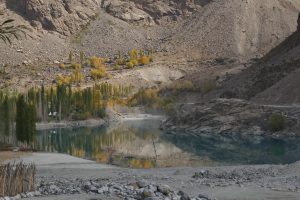
Update from Dushanbe
Hi – we’ve arrived safe but tired, enjoyed 1.5 days to rest, recuperate and see a little of Dushanbe, and began a dense round of meetings this afternoon.
Everyone at UCA organizing our visit is being super-helpful and thoroughly enjoyable company. And thank goodness they speak several languages. You seem to need either Tajik or Russian here to get anywhere other than “standard” locations. Like the museum. We lucked out twice, with awesome guides, first at the phenomenally beautiful Ismaili Centre (https://the.ismaili/dushanbe/architecture-dushanbe), and then at the antiquities museum were a Tajik guide generously shared her boundless knowledge of the region’s archaeology (constantly interesting since neolithic times – including Greek communities established by Alexander), in very good English. Two hours was barely enough! See http://www.afc.ryukoku.ac.jp/tj/tajikistanEnglish/index.html
The objectives related to familiarization with UCA and it’s various components are being met by meeting with contributors to UCA’s various programs, and by the endless patience of staff as they answer our many questions about students, courses in their first two (of five) years, logistics and infrastructure etc. etc. etc. It’s going to be a bit of “cognitive overload” – but there are four of us, thank goodness. Making a brand new university, with three brand new campuses in three different nations, a yet-to-be-completed roster of research and teaching faculty, a second year of undergraduate students well into their first term … I don’t know how they are doing it. But they are passionate, energetic, smart, and phenomenal “diplomats” and communicators. It’s a privilege to be part of the vision.
Maybe some pictures next time. For now I have only a few tourist images of the core of Dushanbe, and some recollections of great food at excellent local places. And it’s warm for this time of year – up to 27deg C. and sunny!
UBC visit to UCA’s Khorog campus
Our little team departs today to spend 3-4 days in Dushanbe and 4-5 days at the UCA Khorog campus (depending on travel arrangements between them). Lucy Porritt, Linda Strubbe, Phil Hammer and Francis Jones (see personnel) are carrying the UBC flag for this visit, and others will hopefully make a trip in late spring or summer.
Our main objectives are to meet UCA / MSRI colleagues, stake holders, students and locals with interests in Earth or environmental sciences, and to reach further consensus on curriculum, course scheduling and other program-specifics that influence the way this EES program is developed.
With amazingly well organized UCA support, we look forward to a productive time – they have created a very full itinerary, and we are bound to come away much better informed about our role and opportunities for collaboration.
We’ll try to post here as the visit progresses – we’ll see 🙂
